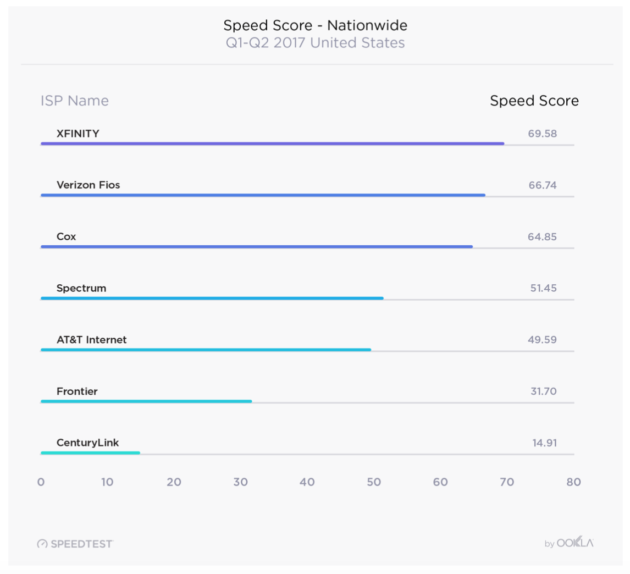
Mobile and fixed broadband internet speeds in the U.S. are improving, but not all carriers and providers are created equal and not all areas of the country are benefitting equally from fast speeds.
Those are the findings according to a new market report from Speedtest by Ookla out of Seattle, which relied on data it captured from user-initiated tests during the first half of 2017. And for customers using T-Mobile for mobile internet and Comcast Xfinity for broadband, the results are especially good.
Speedtest credits infrastructure investments and upgrades as well as increased affordability of higher tiered packages for the fact that fast broadband keeps getting faster. The average download speed in the U.S. over fixed broadband during Q1 to Q2 was 64.17 Mbps (ranking 15th in the world) and average upload speed was 22.79 Mbps (24th in the world).

Xfinity is the top provider when it comes to Speed Score — which incorporates low-end, median and top-end performance for both download and upload speed — with a score of 69.58. Speedtest says that Comcast has been aggressively seeding the market over the past year with advanced modems capable of delivering a more consistent experience for customers. The cable provider has also been increasing the amount of DOCSIS 3.1 channels in order to deliver faster speeds, according to the report.

When looking at specific regions of the country, Xfinity is tops in the West and Northeast, while Suddenlink is the fastest provider in the South and Mediacom tops the Midwest. But the view highlights how much better broadband speeds can be in different parts of the U.S., with the Midwest and Northeast lagging.
When it comes to average fixed broadband speed on all platforms for the 100 largest cities, Kansas City, Mo., is on top followed by Austin; San Francisco; Charlotte, N.C.; and Atlanta.
Laredo, Texas had the slowest average speed, followed by Toledo, Ohio; Buffalo, N.Y.; Milwaukee; and El Paso, Texas.

When it comes to mobile, Speedtest found that improvements in technology and usage of available network spectrum led to a 19-percent increase in average download speeds in the U.S. to 22.69 Mbps. Last year’s report found that speeds jumped 33 percent year over year. Upload speeds improved slightly this year, up 4 percent to 8.51 Mbps.
These speeds give the U.S. a ranking of 44th in the world when it comes to fastest mobile internet speeds, down from 42nd last year. Speedtest points out that the geographic breadth of the U.S. makes it challenging for cellular speeds to compete with smaller, more densely populated nations.

While all four major carriers had increased download speeds, not all areas of the country are enjoying those benefits. Customers in rural areas saw average download speeds of 17.93 Mbps, which is 20.9 percent slower than the nation as a whole.
T-Mobile has the fastest network in the U.S. with a Speed Score of 23.17, and Speedtest credits the Bellevue, Wash.-based carrier’s tightly spaced cell site grid and smaller subscriber base as possible keys to success. Verizon tops AT&T and Sprint in the race behind T-Mobile.

T-Mobile is the fastest carrier in 40 of the 100 most populous cities in the U.S. Verizon is tops in 35, AT& T in 20 and Sprint in five.
Fort Wayne, Ind., had the fastest average mobile download speeds during the test period, followed by Minneapolis, Saint Paul, Atlanta and Pittsburgh. The slowest speed on the list — 32.2 percent slower than the national average — is in North Las Vegas. Laredo, Texas; Las Vegas; Newark, N.J.; and Aurora, Colo., round out the five cities with slowest download speeds.



